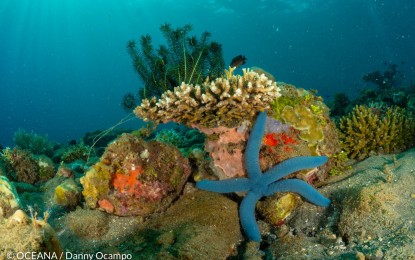
MARINE BIODIVERSITY. A variety of healthy and colorful corals, sponges, and other marine organisms found at the reefs off Panaon Island in Southern Leyte. Movement restrictions due to coronavirus disease 2019 (Covid-19) pandemic prompted an international organization to stop the Southern Leyte Coral Reef Conservation Project. (Photo courtesy of Oceana Philippines)
TACLOBAN CITY – Movement restrictions due to coronavirus disease 2019 (Covid-19) pandemic has prompted an international organization to stop the Southern Leyte Coral Reef Conservation Project (SLRCP).
An official statement on Tuesday by Alistair Cole, United Kingdom-based Coral Cay Conservation chief executive officer, said the organization made a difficult decision to close the SLRCP due to the health crisis that continues to disrupt international travel and cause strain on resources and finances.
Founded in 2002, the SLRCP aims to secure the long-term benefits and services of coral reefs and associated systems; protecting food security and supporting livelihoods of the residents in the Southern Leyte province, according to the information on the website of Coral Cay.
It also aims to enhance marine biodiversity and alleviate community poverty through the evaluation, protection, and restoration of coral reefs, and associated ecosystems in the province.
The project is implemented into two phases: the LRCP Phase I (2002 to 2012) and was founded to assist the provincial government of Southern Leyte in the conservation of the coral reefs of Sogod Bay for the long-term benefit and food-security of residents.
During Phase I, surveys were conducted in the entire Sogod Bay covering the seawaters from the towns of Malitbog, Padre Burgos, Limasawa, and San Francisco towns.
The LRCP Phase II was undertaken between 2013 and 2018 and was founded to develop local capacity and ensure the long-term protection and sustainable use of marine resources, through the establishment, and monitoring, of Marine Protected Areas (MPAs) in Southern Leyte.
Even after the second phase, the project has continued the monitoring of MPAs and build the capacity of communities.
“This closure will be with immediate effect concerning our activities in-country and we will now instigate an exit strategy that will focus on the efficacious transfer of project deliverables to necessary parties. We will cease to accept volunteer bookings over this period for the project,” Cole said.
The group has been present in the country for 25 years advocating for sustainable development and protecting some of the Philippines’ most valuable natural resources.
“This was not an easy decision to make. After several months of deliberating, internal reviews on the project’s timeframe, and the forecast of the Covid-19 pandemic proving uncertain, we have come to this decision. We aim to ensure that the achievements of the project, made possible by the support of volunteers, scholars and committed staff, over the past 20 years, are sustainable and that local stakeholders and government units can continue receiving the benefits of the project,” he added.
The group thanked the thousands of volunteers who helped them in their projects, train scholars and teams that have brought conservation and coral reefs to the forefront of hundreds of classrooms, inspiring the next generation of environmental advocates.
“Over the past 18 years, the rich biodiversity of Sogod Bay has been mapped, countless Marine Protected Areas have been established and even the smallest of conservation efforts have proved vital; all of which would not be possible without the support of the Coral Cay Conservation community,” Cole said.
Since the project started, Coral Cay through SLRCP has undertaken over 2,400 independent surveys, collecting critical ecological, environmental, and anthropogenic data, allowing building a detailed picture of the current status of the area and assessing any changes over time.
The information and data collected by the group are available on their official website, https://www.coralcay.org/the-philippines. (PNA)
